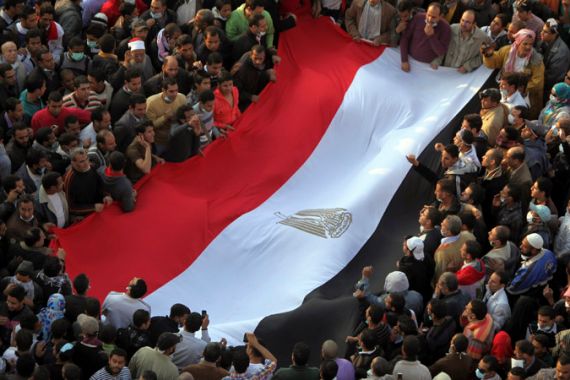Egypt army apologises for protester deaths
Ruling military council expresses “regret” and offers “deep apologies” for protesters killed during six days of unrest.

Egypt’s ruling military council has apologised for the deaths of demonstrators during six straight days of anti-military rallies.
“The Supreme Council of the Armed Forces presents its regrets and deep apologies for the deaths of martyrs from among Egypt’s loyal sons during the recent events in Tahrir Square,” it said on Thursday in a statement on its Facebook page.
The apology by the SCAF came amid a tense calm across the country following street battles which left 38 people dead and more than 3,000 wounded.
Al Jazeera’s Malika Bilal, reporting from Cairo, said “the army is out in relative force to enforce the peace…the centre of Tahrir Square is peaceful. Protesters have begun cleaning up”.
Clashes between protesters and security forces erupted on Saturday, days ahead of three-phase parliamentary elections scheduled to begin on Monday – casting the country’s political future into question.
However, Mamdouh Shahin, major general of the military council, said in a news conference on Thursday that election plans would continue as planned.
Shahin also assured demonstrators that those responsible for killing or injuring protesters would be held accountable and that many detainees would be released as early as Saturday.
He did not, however, meet the protesters’ primary demand of immediately handing over power to a civilian authority.
Truce violated
Monday’s elections will be Egypt’s first vote since long-time ruler Hosni Mubarak was ousted from power in February by a popular uprising.
A temporary truce between security forces and protesters broke down on Wednesday night in and around Cairo’s Tahrir Square, the epicentre of public dissent.
Police from the interior ministry’s Central Security Forces appeared to fire an unprovoked barrage of tear gas at a large crowd gathered on Mohamed Mahmoud Street, witnesses said, despite the truce that had settled in after the arrival of army vehicles and religious scholars.
“Interior ministry forces are out of control … they’re not being professional and they’re not being controlled by the military council,” Rebab el-Mahdy, a politics professor at the American University in Cairo, told Al Jazeera.
Ambulances raced back from Mohamed Mahmoud Street and other frontline battles south and east of the square throughout the night, ferrying dozens of protesters suffering from tear-gas inhalation.
Fighting also resumed in other cities. In Alexandria, Egypt’s second-largest city, clashes erupted for another night along a street near the main security directorate.
Riot police there fired tear gas after the withdrawal of the army, which had stepped in to oversee a prisoner release.
Besides Alexandria, clashes were reported in the city of Ismailia that left at least one person dead and two others injured.
Concessions rejected
Meanwhile, thousands of people have remained in Tahrir Square, rejecting concessions offered during a Tuesday-night speech by Field Marshal Muhammed Hussein Tantawi, the chairman of the ruling military council which took power following Mubarak’s ouster.
“The people want the fall of the field marshal,” they called in thunderous unison, waving large Egyptian flags and signs denouncing the military.
The crisis began when riot police violently cleared a small encampment in Tahrir Square on Saturday, and protesters say the continued fighting has hardened their resolve to remove the military from power and complete a revolution that began in January.
Tantawi announced on state media that the military had no interest in staying in power and that parliamentary elections would go ahead.
He also pledged that the presidential election would take place before July 2012, the first time the military has set a deadline for the vote.
The presidential election would mark the last step in a transition of power to civilian rule.
“We ask for fair elections. We do not care who runs for elections and who is elected president and yet we are accused of being biased,” Tantawi said on in his address.
But protesters in Tahrir Square and elsewhere remain unconvinced and say they would not go home until the military council steps down.
“There was nothing he could say that would meet our expectations. They have nothing to give us. All we want is for the end of military rule, immediately,” Sherief Gaber, a 27-year-old demonstrator, told Al Jazeera.